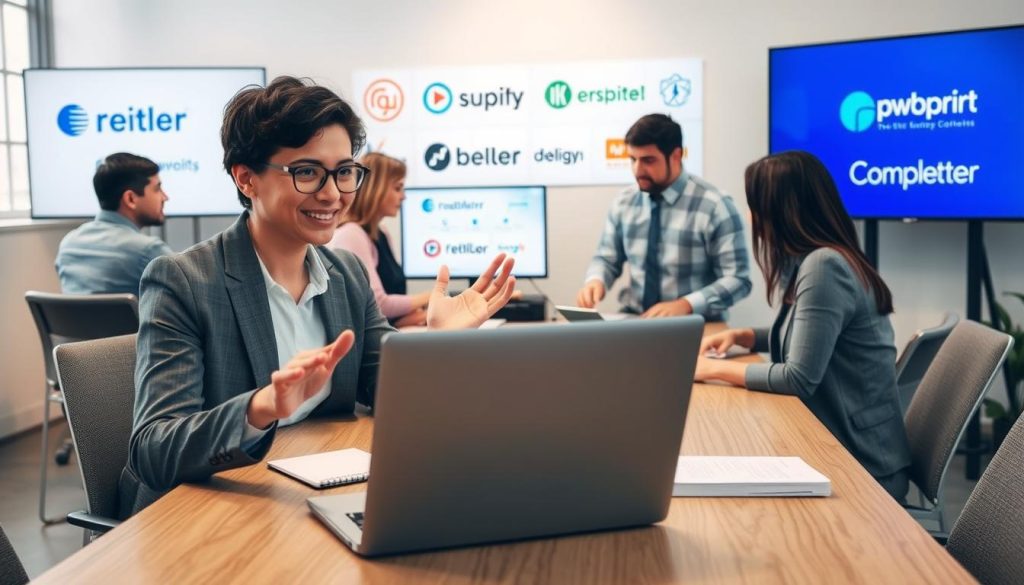Securing money for your ideas can feel overwhelming. Many organizations struggle with complex application processes. This is where specialized help makes a huge difference.
A skilled professional brings expertise to your funding efforts. They understand what review committees want to see. Their knowledge increases your success rate significantly.
Platforms like Kolabtree and Freelancer.com connect you with talented individuals. These experts often earn around $5,000 monthly helping projects succeed. They work across various fields from nonprofits to medical research.
The right partner tailors their approach to your specific needs. They handle everything from research to polished proposals. This personalized service maximizes your funding potential.
Table of Contents
Key Takeaways
- Specialized writers significantly improve funding success rates
- Flexible engagement options suit various project needs
- Professional writers understand complex application requirements
- Platforms offer access to highly rated writing talent
- Investment in quality writing delivers long-term funding benefits
- Clear project scope and budget help find the right match
Why Your Organization Needs a Professional Grant Writer
Many organizations dream of turning their visions into reality through innovative projects. Without proper financial backing, these dreams often remain just that – dreams. This is where strategic funding support becomes absolutely essential.
The Critical Role of Grant Funding in Project Success
Grant funding serves as the lifeblood for countless initiatives across various sectors. It provides the necessary resources to launch new programs, expand existing services, and drive meaningful change. Organizations that secure consistent funding often achieve remarkable growth and impact.
Financial support through grants enables innovation that might otherwise remain unrealized. It allows teams to focus on their core mission rather than constant fundraising concerns. This stability creates opportunities for long-term planning and sustainable development.
Successful funding acquisition transforms how organizations operate. It opens doors to new partnerships, enhances community credibility, and amplifies overall effectiveness. The right financial backing can literally change lives and communities.
Common Challenges Organizations Face in Grant Applications
Many groups struggle with the complex landscape of funding opportunities. Identifying the right matches for their specific needs proves difficult without proper research tools and experience. The competition for limited resources continues to intensify each year.
Tight deadlines create significant pressure throughout the application process. Complex requirements and specific formatting demands add layers of difficulty. Many potentially worthy projects never receive consideration due to technical submission errors.
Crafting persuasive narratives that align with funder priorities requires particular skill. Organizations often underestimate the importance of storytelling in their proposals. Weak narratives or incomplete submissions frequently lead to rejection despite strong project concepts.
Professional assistance dramatically improves success rates according to industry data. Experts bring valuable insights into what review committees truly want to see. Their strategic approach transforms the entire funding pursuit experience.
Various sectors benefit immensely from specialized support. Nonprofits, educational institutions, and healthcare organizations particularly value this expertise. The emotional and logistical relief provided allows teams to concentrate on their primary work.
Securing grants creates transformative impacts that ripple through communities. From local neighborhood improvements to groundbreaking scientific advancements, proper funding makes everything possible. The right partnership turns funding challenges into remarkable success stories.
Understanding What a Freelance Grant Writer Brings to Your Project
Expert assistance transforms how organizations approach funding opportunities. These professionals bring specialized skills that dramatically improve success rates. Their approach combines deep research with compelling storytelling techniques.

Specialized Expertise in Grant Research and Identification
Skilled professionals master complex database systems to uncover ideal funding matches. They use platforms like Instrumentl, which offers a $50 discount with code LGW. This systematic approach ensures no suitable opportunity goes unnoticed.
Thorough evaluation determines whether a funding source aligns with your specific needs. Experts examine eligibility requirements, deadlines, and award amounts. This careful screening saves valuable time and resources.
Many specialists hold advanced degrees including Ph.D. and MPH credentials. Their educational background provides unique insights into various funding landscapes. This knowledge proves particularly valuable for technical or scientific projects.
| Research Aspect | Professional Approach | Client Benefit |
|---|---|---|
| Database Utilization | Advanced search techniques across multiple platforms | Comprehensive funding opportunity identification |
| Eligibility Assessment | Detailed analysis of funder requirements and priorities | Focused efforts on most promising opportunities |
| Industry Knowledge | Specialized understanding of sector-specific funding | Higher alignment with funder expectations |
| Trend Monitoring | Continuous tracking of funding patterns and changes | Adaptive strategy based on current opportunities |
Professional Writing and Persuasion Techniques
Compelling narratives transform dry facts into inspiring stories. Professionals use powerful storytelling to highlight your project’s potential impact. They emphasize community benefits and measurable outcomes that resonate with reviewers.
Strategic data presentation strengthens your proposal’s credibility. Experts know how to balance emotional appeal with concrete evidence. This combination proves highly effective during the evaluation process.
Customization ensures each submission meets specific funder guidelines. Professionals adapt tone, format, and emphasis according to each organization’s preferences. This tailored approach significantly increases approval chances.
Many specialists maintain certifications like CFRE credentials. They participate in ongoing education to stay current with best practices. This commitment to excellence benefits every project they handle.
Collaborative methods ensure your unique voice shines through. Experts work closely with your team to gather essential information and insights. This partnership approach creates authentic, persuasive proposals.
The right professional handles complex application requirements effortlessly. They manage everything from budget justification to supporting documentation. This comprehensive service reduces stress and improves outcomes.
Key Qualifications to Look for in a Freelance Grant Writer
Finding the right talent for your funding needs requires careful consideration of specific qualifications. The ideal candidate brings a combination of formal education, practical experience, and proven results.
These professionals should demonstrate expertise across multiple areas. Their background directly impacts your project’s success rate.
Educational Background and Certifications
Advanced degrees signal deep subject matter knowledge. Look for candidates with master’s or doctoral level education in relevant fields.
Science, business, and communications degrees provide strong foundations. These disciplines develop critical thinking and analytical skills.
Professional certifications validate specialized expertise. The CFRE credential requires 91 credit hours of education and experience.
Reputable certificate programs from accredited institutions add credibility. These programs ensure current knowledge of best practices.
Continuous learning through workshops and professional networks keeps skills sharp. The best professionals never stop developing their craft.
Industry-Specific Experience and Knowledge
Sector-specific experience dramatically improves proposal quality. Professionals understand unique challenges in different industries.
Nonprofit, healthcare, and educational sectors have distinct funding landscapes. Technology startups face different requirements than research institutions.
Familiarity with your industry’s terminology and priorities creates stronger proposals. This knowledge helps tailor applications to specific funder expectations.
Cultural competence and adaptability prove essential for cross-sector work. These soft skills ensure effective collaboration with diverse teams.
Ask about previous projects and client types during interviews. This reveals their comfort level with your specific needs.
Proven Track Record of Successful Grants
Past performance indicates future success. Request concrete examples of funded proposals.
Look for diversity in grant types and sizes handled. Federal, foundation, and corporate grants require different approaches.
Client testimonials and references provide valuable insights. These reveal work quality and professional reliability.
Portfolios should demonstrate strong writing and research capabilities. Samples show their ability to craft compelling narratives.
Success rates matter more than total number of applications. Quality consistently outperforms quantity in funding acquisition.
Balance qualifications with your budget considerations when hiring. The right investment delivers significant returns through successful funding.
Verify credentials through reference checks and work samples. This due diligence ensures you select the best partner for your projects.
Where to Find Qualified Freelance Grant Writers
Navigating the search for skilled proposal specialists requires knowing where to look. Multiple channels connect organizations with talented professionals who excel at securing funding.
The right platform or network makes all the difference in finding your perfect match. These resources streamline the hiring process while ensuring quality candidates.

Specialized Freelance Platforms and Marketplaces
Online marketplaces offer incredible access to global talent pools. Platforms like Kolabtree and Freelancer.com feature professionals with diverse backgrounds.
These sites provide valuable tools for your search process. You can filter candidates by experience level, industry specialization, and budget requirements.
User reviews and success rates help identify top performers. Many platforms include secure payment systems and project management features.
The right platform transforms how organizations connect with exceptional writing talent
Popular options include:
- Kolabtree – Known for scientific and technical experts
- Freelancer.com – Large global community with varied experience levels
- Upwork – Comprehensive filtering and communication tools
Posting projects requires clear descriptions and realistic budgets. Detailed project scope attracts better candidates and improves outcomes.
Professional Grant Writing Associations and Networks
Industry associations provide curated lists of vetted professionals. Organizations like the Grant Professionals Association maintain strict membership criteria.
These networks often require certifications and proven success records. You benefit from pre-screened candidates who meet industry standards.
Key associations to explore:
- American Grant Writers’ Association
- Global Grant Writers Collective
- Local nonprofit networks and chambers of commerce
Social media platforms, especially LinkedIn, offer additional discovery channels. Professional groups and industry discussions reveal talented individuals.
Referrals from within your network often yield trusted relationships. Colleagues in similar organizations provide valuable recommendations.
Leveraging multiple sources increases your chances of finding the ideal match. Combine platform searches with association referrals for comprehensive coverage.
Always review profiles, portfolios, and client feedback before engagement. This due diligence ensures you select professionals who understand your specific needs.
The Evaluation Process: Assessing Potential Candidates
Choosing the right person for your funding needs involves careful evaluation. This process helps ensure you find someone who truly understands your goals.
A systematic approach saves time and prevents costly mistakes. It also builds confidence in your final selection.
Reviewing Portfolios and Writing Samples
Strong portfolios show diversity in completed projects. Look for various grant types and funding amounts.
Success rates matter more than total applications submitted. Quality proposals consistently outperform quantity.
Writing samples reveal important skills. Check for clear structure and persuasive arguments.
Adherence to specific guidelines demonstrates attention to detail. This quality often separates good candidates from great ones.
Checking References and Past Client Feedback
References provide real-world insights about performance. Contact previous clients to verify reliability.
Platform ratings offer valuable information. Kolabtree features professionals with 4.9/5 star ratings.
Ask about communication styles and deadline management. These factors greatly impact project success.
Inquire about problem-solving abilities. Challenges inevitably arise during complex applications.
Conducting Effective Interviews
Prepare specific questions about similar projects. This reveals relevant experience.
Discuss their research process for identifying opportunities. Strong investigation skills are crucial.
Evaluate communication abilities during conversations. Collaboration requires clear information exchange.
Consider trial projects for quality assessment. Small tasks show approach and work quality.
Discuss timelines and availability openly. Ensure their schedule matches your project needs.
Watch for warning signs during evaluation. Vague portfolios or poor responsiveness indicate potential issues.
Balance cost with qualifications when making decisions. The right investment brings significant funding returns.
Trust your instincts about personal fit. Successful partnerships require good working relationships.
Understanding Pricing Models for Grant Writing Services
Budgeting for professional assistance requires understanding different payment approaches. Smart financial planning ensures you get maximum value for your investment.
Most specialists offer two main pricing structures. Each model serves different project needs and preferences.

Project-Based Fees vs Hourly Rates
Fixed project fees provide clear cost expectations from the start. You pay a set amount for complete proposal development.
This approach works well for defined scopes with clear requirements. It protects against unexpected hours adding to your budget.
Hourly rates offer flexibility for evolving or complex projects. You pay only for actual time spent on your specific needs.
Many experienced professionals charge between $50-$100 per hour. This reflects their expertise and specialized knowledge.
Factors That Influence Grant Writing Costs
Several elements affect final pricing for professional services. Understanding these helps create realistic budget expectations.
Project complexity significantly impacts the overall cost. Simple applications cost less than detailed scientific proposals.
Research requirements add time and expense to the process. Comprehensive funding searches need more investment than targeted approaches.
Specialist experience level influences their rates significantly. Highly qualified professionals command premium pricing for their expertise.
Platforms like Kolabtree show average project fees of $450-$550. This reflects typical market rates for quality work.
Additional expenses might include database subscriptions or rush fees. These should be discussed during initial conversations.
Value-based pricing ties fees to potential funding amounts. This aligns specialist compensation with your success outcomes.
Clear contracts and milestone payments ensure transparency throughout. They protect both parties and maintain good working relationships.
Negotiation opportunities exist for multiple projects or long-term partnerships. Bundling services can reduce overall costs significantly.
Always balance price considerations with quality expectations. The right investment delivers excellent returns through successful funding.
View professional assistance as strategic investment rather than simple expense. Proper budgeting maximizes your funding potential.
Essential Skills Beyond Writing: What to Prioritize
Successful funding acquisition depends on more than just polished writing abilities. The best professionals bring comprehensive capabilities that transform your entire approach.
These additional skills often determine whether applications succeed or fail. They create efficient processes and stronger outcomes.
Research Capabilities and Strategic Thinking
Thorough investigation forms the foundation of effective funding strategies. Professionals master complex database systems and analytical tools.
They employ platforms like Instrumentl to identify ideal opportunities. This systematic approach ensures no suitable funding source goes unnoticed.
Strategic thinking involves aligning proposals with organizational goals. Experts consider long-term funding needs rather than individual applications.
Critical analysis separates promising opportunities from poor matches. This saves valuable time and resources while improving success rates.
| Research Component | Professional Application | Client Benefit |
|---|---|---|
| Database Proficiency | Advanced search techniques across multiple platforms | Comprehensive funding opportunity identification |
| Critical Analysis | Evaluation against organizational goals and capacity | Focused efforts on most promising opportunities |
| Data Gathering | Systematic collection of supporting evidence and statistics | Stronger proposal justification and credibility |
| Strategic Alignment | Matching funder priorities with project objectives | Higher approval rates and better funder relationships |
Project Management and Timeline Adherence
Complex applications require careful organization and scheduling. Professionals create detailed timelines with clear milestones.
They prioritize tasks based on deadlines and importance. This structured approach prevents last-minute rushes and errors.
Meeting submission deadlines is absolutely critical for success. Even excellent proposals fail if delivered late.
Adaptability ensures smooth handling of unexpected changes. Scope adjustments or new requirements get incorporated seamlessly.
Communication and Collaboration Abilities
Regular updates keep everyone informed throughout the process. Professionals maintain clear channels for questions and feedback.
They translate complex ideas into understandable language. This clarity helps teams and reviewers grasp project value.
Collaboration involves working seamlessly with your entire team. Writers gather essential information while respecting your expertise.
Responsiveness demonstrates professional commitment and reliability. Quick replies prevent delays and maintain momentum.
Ethical practices ensure confidential information remains protected. Trust forms the foundation of successful partnerships.
The right combination of these skills creates remarkably smooth experiences. They transform funding acquisition from stressful to strategic.
The Grant Writing Process: What to Expect
Understanding the typical workflow helps you prepare for a successful collaboration. This structured approach ensures nothing gets overlooked while maximizing your funding potential.
Each phase builds upon the previous one. Clear communication keeps everything moving smoothly toward your goals.

Initial Research and Funding Strategy Development
Everything begins with thorough investigation. Professionals use specialized tools to identify suitable opportunities.
They examine eligibility requirements and funding criteria. This careful screening saves time and resources.
Strategic planning matches your project needs with available grants. This alignment significantly improves success rates.
Your input during this phase provides essential insights. Collaboration ensures the strategy reflects your true priorities.
Proposal Writing and Refinement Stages
The actual composition involves multiple drafts and revisions. Writers transform your information into compelling narratives.
They incorporate supporting data and budget details. This creates comprehensive proposals that reviewers appreciate.
Editing ensures compliance with all guidelines. Attention to detail prevents technical rejections.
Your feedback during reviews enhances the final product. This partnership approach yields superior results.
Submission and Follow-up Procedures
Meeting deadlines requires careful timeline management. Professionals handle various submission methods.
They navigate online portals and mail-in requirements. This expertise prevents last-minute complications.
After submission, they monitor application status. Prompt responses to funder inquiries maintain momentum.
Additional information requests get handled efficiently. This comprehensive service continues through final decisions.
Typical timelines range from several weeks to months. Complex applications naturally require more time.
The entire process demands accuracy and attention. Small errors can unfortunately lead to rejection.
Common deliverables include draft proposals and final submissions. Follow-up reports provide valuable closure.
This structured approach reduces stress while increasing success. Proper planning makes the journey rewarding.
Developing an Effective Funding Strategy Together
Strategic planning transforms grant seeking from stressful guessing to confident action. This collaborative approach ensures your efforts target the most promising opportunities.
A solid funding roadmap prevents wasted energy on poorly matched applications. It focuses your resources where they’ll deliver the best results.
Identifying the Right Grant Opportunities
Thorough research forms the foundation of any successful strategy. Professionals use specialized tools like Instrumentl to uncover ideal matches.
Database searches combine with industry networking to identify potential funders. This dual approach ensures comprehensive coverage.
Evaluation criteria include alignment with your mission and project requirements. Competitive analysis determines realistic success probabilities.
Application demands and timeline feasibility get careful consideration. This prevents overcommitment to unrealistic opportunities.
Creating a 12-18 Month Funding Roadmap
Your roadmap outlines which grants to pursue and when to apply. This timeline typically spans 12-18 months for optimal planning.
Spreadsheets or project management software help track progress. These tools provide clear visibility into upcoming deadlines.
The strategy remains flexible to accommodate new opportunities. Funding outcomes or changing priorities may require adjustments.
Ongoing research ensures your plan reflects current funder interests. Regular updates keep your approach fresh and relevant.
Collaboration between your team and writing professionals enhances strategy development. Combined insights create stronger plans.
Benefits include reduced team burnout and better resource allocation. Sustained funding becomes achievable through systematic effort.
A well-planned strategy transforms chaotic grant seeking into strategic effectiveness
This approach increases ROI by focusing on high-success proposals. Your investment in quality planning delivers remarkable returns.
Building a Successful Working Relationship
A strong partnership with your proposal specialist forms the foundation for funding success. This collaboration requires thoughtful planning and mutual understanding from the very beginning.
Setting Clear Expectations and Deliverables
Begin with a detailed discussion about project scope and desired outcomes. Outline specific deliverables, timelines, and compensation terms clearly.
A comprehensive agreement protects both parties and prevents misunderstandings. This document should cover all aspects of your collaboration.
Payment structures work best when tied to measurable milestones. This approach keeps projects moving forward smoothly.
Consider using clear, legally binding documents that define responsibilities for both parties. Proper agreements minimize communication gaps and financial risks.
Establishing Effective Communication Channels
Choose communication methods that work for everyone involved. Regular check-ins maintain momentum and address questions quickly.
Weekly progress updates keep both sides informed about developments. Document any changes in writing to avoid confusion later.
Collaboration platforms like Slack or Trello facilitate smooth information exchange. These tools help organize discussions and file sharing.
Responsiveness from both sides ensures the project stays on track. Prompt replies prevent delays and maintain positive momentum.
Managing Timelines and Milestones
Create a detailed schedule with specific deadlines for each phase. This structure provides clear guidance throughout the process.
Build contingency plans for potential delays or unexpected challenges. Flexibility helps navigate obstacles without compromising quality.
Celebrate completed milestones to maintain team motivation. Recognizing progress strengthens your working relationship.
Learn from challenges together to improve future collaborations. Each project offers valuable insights for better outcomes.
Trust and transparency transform assumptions into actionable plans. This foundation leads to remarkable funding results and potential long-term partnerships.
Common Challenges When Working with Freelance Grant Writers
Collaborating with external specialists brings incredible benefits but also unique hurdles. Understanding these challenges helps you prepare effective solutions.
Most issues fall into two main categories: remote collaboration and quality assurance. Both require thoughtful approaches for successful outcomes.
Managing Remote Collaboration Effectively
Geographical separation creates natural obstacles in any partnership. Different time zones can delay responses and decision-making.
Technology issues sometimes disrupt smooth communication. Unreliable internet or incompatible software slows progress.
Clear strategies overcome these barriers effectively. Scheduled virtual meetings create consistent touchpoints.
Shared digital workspaces keep everyone organized. Platforms like Trello or Asana track tasks visually.
Cultural differences matter in international collaborations. Language nuances affect understanding and expectations.
Simple adjustments improve cross-cultural work. Confirming understanding prevents misinterpretation.
Ensuring Quality and Meeting Deadlines
Quality consistency remains crucial throughout the writing process. Regular reviews maintain high standards.
Detailed checklists ensure nothing gets overlooked. They cover formatting, content, and compliance requirements.
Performance metrics provide objective quality measurements. Success rates and feedback scores offer valuable insights.
Deadline management requires proactive communication. Early warnings about potential delays help adjust plans.
Clear documentation supports consistent outcomes. Process guides standardize approach across projects.
Conflict resolution skills keep projects on track. Addressing issues quickly prevents larger problems.
| Challenge Category | Common Issues | Effective Solutions |
|---|---|---|
| Remote Collaboration | Time zone differences, technology gaps | Scheduled meetings, shared workspaces |
| Communication | Delayed responses, unclear instructions | Regular updates, confirmation protocols |
| Quality Assurance | Inconsistent standards, missed requirements | Checklists, performance metrics, reviews |
| Timeline Management | Missed deadlines, scope creep | Milestone tracking, proactive updates |
| Cultural Considerations | Language barriers, different expectations | Cultural awareness, clear documentation |
Choosing professionals with proven remote experience helps immensely. Their references demonstrate adaptability and reliability.
Tools like video conferencing bridge geographical gaps effectively. Cloud storage ensures everyone accesses current documents.
Overcoming these challenges leads to remarkable outcomes. Strong partnerships yield successful proposals and continued collaboration.
Proper planning transforms potential obstacles into manageable processes. The right approach ensures smooth, productive relationships.
Measuring ROI: Evaluating Your Investment in a Freelance Grant Writer
Understanding the return on your investment in professional proposal development helps justify future funding efforts. Tracking outcomes demonstrates clear value beyond initial costs.
Smart organizations measure both financial returns and strategic benefits. This comprehensive approach informs better decision-making.
Tracking Success Rates and Funding Obtained
Key performance indicators reveal your actual results. Approval rates and dollar amounts funded tell the real story.
Simple calculations show your net gains clearly. Compare investment costs against awards received.
Dashboards visually display your progress over time. These tools make complex data easy to understand.
| Metric | Calculation Method | What It Reveals |
|---|---|---|
| Approval Rate | Funded proposals ÷ Total submissions | Overall effectiveness of your approach |
| Average Award Amount | Total funding ÷ Number of awards | Typical grant size you achieve |
| Cost per Proposal | Total investment ÷ Number of submissions | Efficiency of your funding efforts |
| Return on Investment | (Total awards – Total investment) ÷ Total investment | Net financial gain from your strategy |
| Time to Funding | Days from submission to award notification | Speed of your funding pipeline |
Regular reporting keeps stakeholders informed. Share success stories and lessons learned.
Continuous improvement relies on accurate data. Refine your approach based on actual results.
Long-term Value Beyond Individual Grants
Strategic benefits extend far beyond immediate funding. Your organization develops stronger capabilities over time.
Institutional knowledge grows with each submission. Teams become more proficient in funding acquisition.
Non-financial returns matter significantly. Reduced stress and saved time improve overall operations.
Enhanced reputation attracts more opportunities. Funders notice consistent quality in your submissions.
The true value of professional assistance extends beyond individual awards to create sustainable funding streams
Reliable funding supports project scalability and growth. Organizations can plan further ahead with confidence.
Strong relationships with funders develop through successful partnerships. These connections yield future opportunities.
View proposal development as a high-return investment. The right approach delivers remarkable financial and strategic benefits.
Communicating these advantages helps secure ongoing support. Demonstrate value through clear metrics and stories.
Conclusion: Making the Right Choice for Your Funding Needs
Your organization’s growth trajectory depends on making informed decisions about proposal development support.
Specialized assistance brings expertise that dramatically improves funding outcomes. Platforms like Kolabtree connect you with top-rated professionals who understand complex application requirements.
Prioritize qualifications over cost when selecting your partner. Foster collaborative relationships that yield remarkable results.
The right investment transforms funding challenges into sustainable success stories. Your projects deserve the support that turns visions into reality.
FAQ
What does a professional grant writer do?
A skilled grant writer helps organizations secure funding by researching opportunities, crafting compelling proposals, and managing the submission process. They combine persuasive writing with strategic thinking to maximize your chances of success.
How much does it cost to hire a grant writer?
Costs vary based on project complexity, experience level, and pricing model. Many professionals charge project-based fees ranging from ,500 to ,000+, while others use hourly rates between -0. The investment often pays for itself through secured funding.
What qualifications should I look for in a grant writer?
Look for relevant education, industry-specific experience, and a proven track record of successful grants. Certifications from organizations like the Grant Professionals Association can indicate serious commitment to the field.
Where can I find qualified grant writing professionals?
Specialized platforms like Upwork and Guru, professional associations, and networking through nonprofit circles are excellent starting points. Many successful writers come through referrals from other organizations.
How do I evaluate potential grant writing candidates?
Review their portfolio samples, check references thoroughly, and conduct interviews focusing on their research process, communication style, and understanding of your specific needs. Ask about their success rates with similar projects.
What makes a grant proposal successful?
Winning proposals typically combine thorough research, clear alignment with funder priorities, compelling storytelling, realistic budgets, and measurable outcomes. Professional writers excel at presenting your project in the most favorable light.
How long does the grant writing process typically take?
The timeline varies but usually spans 4-8 weeks from research to submission. Complex proposals or tight deadlines might require accelerated schedules, while multiple submissions benefit from longer-term strategic planning.
What communication should I expect during the process?
You should receive regular updates, draft reviews, and opportunities for feedback. Establishing clear communication channels from the beginning ensures everyone stays aligned throughout the project lifecycle.





